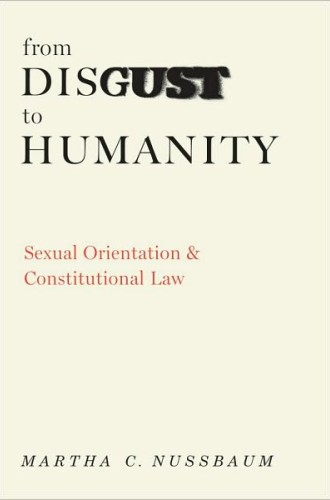From Disgust to Humanity, by Martha C. Nussbaum
Amid a flailing economy at home and continuing U.S. military engagement abroad, issues of sexuality retain a prominent place on the American political agenda. Do Americans simply have a prurient obsession with what others do in the privacy of their bedrooms, or do the continuing debates about sexual orientation reflect deeper divisions in our culture? What is the root reason that gay, lesbian, bisexual and transgender people are so widely perceived as deviant? How should the Christian community respond to the many contentious issues that arise from differences in sexual orientation?
Same-sex marriage is now fully legal in six states plus the District of Columbia. The U.S. military's controversial "don't ask, don't tell" policy has been repealed. LGBT clergy increasingly are welcomed as leaders of mainline Protestant and Jewish congregations. Poll after poll indicates growing tolerance of LGBT people among the American public—particularly among younger people. Some perceive the coming of LGBT equality as inevitable and rejoice, while others lament the passing of yet another element of traditional American morality. Cultural change is always welcomed by some and profoundly resisted by others.
In From Disgust to Humanity, legal scholar Martha Nussbaum of the University of Chicago moves through the rhetoric surrounding homosexuality and asserts that aversion to LGBT people, and thus opposition to their social equality, is rooted in the "politics of disgust": dominant groups' tendency to label particular beliefs, practices and innate characteristics as not just anathema but physically disgusting, which legitimizes systematic mistreatment of people who embody the undesirable beliefs, practices or characteristics.






